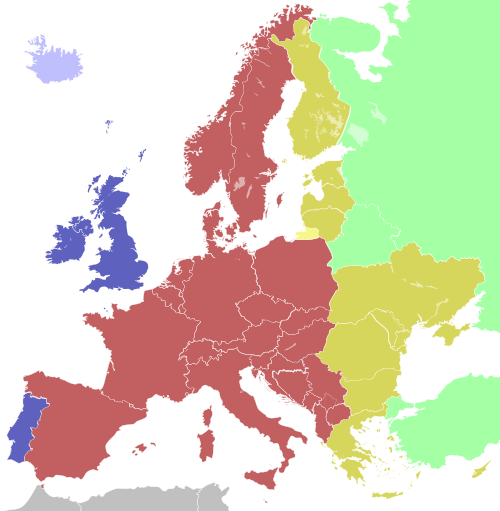Eastern European Time

Time zones of Europe in relation to UTC:
Light colours indicate countries that do not observe summer time.
| blue | Western European Time (UTC+0) Western European Summer Time (UTC+1) |
| light blue | Western European Time (UTC+0) |
| red | Central European Time (UTC+1) Central European Summer Time (UTC+2) |
| yellow | Eastern European Time (UTC+2) Eastern European Summer Time (UTC+3) |
| orange | Kaliningrad Time (UTC+3) |
| green | Moscow Time (UTC+4) |
Eastern European Time (EET) is one of the names of UTC+2 time zone, 2 hours ahead of Coordinated Universal Time. It is used in some European, North African, and Middle Eastern countries. Most of them also use Eastern European Summer Time (UTC+3) as a summer daylight saving time.
Where it is used
Two countries uses Eastern European Time all the year:
The following countries, parts of countries, and territories use Eastern European Time during the winter only:
- Bulgaria, since 1894
- Cyprus, (Northern Cyprus abolished daylight saving and has switched to Moscow Time all year long in September 2016, but returned to EET in October 2017)
- Estonia, in years 1921-40 and since 1989
- Finland, since 1921
- Greece, since 1916
- Israel, since 1948
- Jordan
- Latvia, in years 1926-40 and since 1989
- Lebanon
- Lithuania, in 1920 and since 1989
- Moldova, in years 1924-40 and since 1991
- Palestinian territories
- Romania, since 1931
- Syria
- Ukraine, in years 1924-30 and since 1990
Moscow used EET between 1922-30 and 1991-92. In Poland this time was used between 1918-22. Turkey, used EET between 1910-2016 except for the years 1978-85 and has switched to Moscow Time all year long.
In time of World War II MET (CET) was used in eastern countries, occupied by Germany.
Major metropolitan areas
- Athens, Greece
- Beirut, Lebanon
- Brasov, Romania
- Bucharest, Romania
- Cluj Napoca, Romania
- Chişinău, Moldova
- Damascus, Syria
- Helsinki, Finland
- Jerusalem, Israel
- Kyiv, Ukraine
- Lviv, Ukraine
- Minsk, Belarus
- Nicosia, Cyprus
- Riga, Latvia
- Sofia, Bulgaria
- Tallinn, Estonia
- Tel Aviv, Israel
- Thessaloniki, Greece
- Timişoara, Romania
- Vilnius, Lithuania
